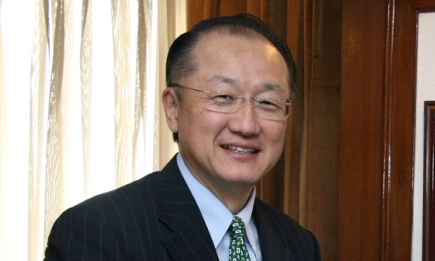By TN Ashok Economic Affairs Editor Diplomacyindia.com / sarkaritel.com
New Delhi, July 25 : World Bank President Jim Yong Kim’s visit to India is significant as he pledged US $ 15 to 18 billion over the next three years for development projects even as he praised the formation of the BRICS National Development Bank (NDB) at the 6th meeting of the BRICS nations in Brazil recently.
“The World Bank group is ready to increase its financial support to support job-oriented skills and infrastructure development in India to US $15 billion to US $18 billion over the next three years, from US $13.4 billion in the previous three years, Kim said soon after a high level meeting with the Indian Prime Minister Narendra Modi here in the capital.
“On the public side of operations we can provide India with between US $15-18 billion, and on the private side of things, a minimum of US $3.5 billion,” Kim said. The World bank President is on a three-day visit to learn more about the new BJP led NDA government’s development priorities.
Indian Prime Minister Narendra Modi on his part said In a statement that the two sides discussed several ways of working together. “Rather than dollars, we are more interested in knowledge and expertise of World Bank. Dr Kim agreed and said World Bank can be our information bank,” the PM tweeted later.
“We want ideas from the World Bank, not only on mass production but also on production by masses, which will benefit our workforce,” The Prime Minister said adding , “We live in a world where speed matters. Quick execution is essential.”
The World Bank President welcomed the US $100 billion development bank founded by the BRICS nations and said the Bretton Woods institution was ready to provide it with technical assistance. The BRICS developing nations – Brazil, Russia, India, China and South Africa – announced the bank last week, saying it would fund infrastructure projects in developing nations.
International observers and diplomatic sources said the new bank was virtually a challenge to the global financial order created by Western powers after World War Two, which seemed to revolve more around the International Monetary Fund and the World Bank. The World Bank President Jim Yong Kim however played down the challenge saying “the only competition we have is with poverty.” “We welcome any bank or a group of institutions that seek to tackle infrastructure problems to fight poverty,” he said.
Kim was told by Modi that India desired World Bank’s knowledge and expertise “rather than dollars” asking the Washington-based institution to speed up project execution. The emerging powers represented by BRICS feel their newfound economic weight is not reflected in their decision-making power at the World Bank and the International Monetary Fund.
Kim went on to praise the Gujarat development model saying if the ranking of doing business in India’s case were just based on doing business in Gujarat, then the nation’s ranking would improve by 50 places. “So, I hope, doing business in India would improve under Modi.” India ranked 134 in the latest ease of doing business index of the World Bank Group.
On the BRICS bank, Kim said the World Bank would be very happy to provide technical assistance and knowledge services for the new institution. “If you look at the need for infrastructure development in the developing countries, it’s enormous. So any bank or any group of institution that are going to tackle the problem of infrastructure investment, to fight poverty, is a welcome step.”
Referring to his meetings with Prime Minsiter Modi and Finance Minister Arun Jaitlye , Kim said : “ I assured them that the World Bank Group will bring to bear all possible knowledge and financing to help them in this task. They have identified infrastructure development and job-oriented skill development as the deep drivers of growth.”
Kim said the World Bank fully supported the new government’s commitment to return India to a growth rate of 9%. India is the largest recipient of funds from the World Bank Group, which committed a total of US $6.4 billion to the country during its last fiscal year (July 2013 to June 2014).
Today, India is home to the largest operations of the International Bank for Reconstruction and Development (IBRD), the International Development Association (IDA), and the International Finance Corporation (IFC).
World Bank Group assistance to India between July 2013 and June 2014 amounted to US $6.4 billion. This included US $2 billion from IBRD, US $3.1 billion from IDA, and US $100 million from the Clean Technology Fund that the World Bank Group administers. During that period, the World Bank Group’s private sector arm, IFC, committed US $1.2 billion in India.
As of June 2014, total IBRD and IDA net commitments in India stood at US $24.4 (IBRD US $12.7 billion, IDA US $11.7 billion) across 84 projects. As of June 2014, the IFC’s India portfolio contained 239 projects, amounting to committed and disbursed exposure of US $5.3 billion. Recent collaborative efforts between the Indian Government the World Bank Group have ensured that India continues to receive high levels of financial assistance.
Recognizing India as a key partner in ending global poverty, the International Development Association (IDA) deputies have provided Transitional IDA funds worth $3.4 billion for the next three years.
For International Bank for Reconstruction and Development (IBRD) lending, the single borrower limit for India has recently been increased to US $20 billion from US $17.5 billion, and the Government of India agreement to purchase Special Private Placement Bonds of up to US $4.3 billion — all geared to help create additional borrowing options for India. In addition, the World Bank Group’s private sector arm, the International Finance Corporation (IFC) has successfully mobilized its US $1 billion offshore rupee bond program, aimed at strengthening India’s capital markets and attracting foreign investments.
